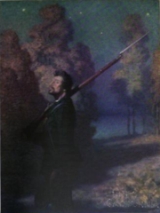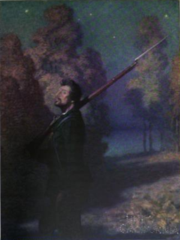
All Quiet Along the Potomac Tonight
Encyclopedia
"All Quiet Along the Potomac Tonight" was a poem first published as "The Picket Guard" by Ethel Lynn Beers
in Harper's Weekly
, November 30, 1861, attributed only to "E.B." It was reprinted broadly both with that attribution and without, leading to many spurious claims of authorship. On July 4, 1863, Harper's Weekly told its readers that the poem had been written for the paper by a lady contributor whom it later identified as Beers.
The poem was based on newspaper reports of "all is quiet tonight" based on official telegrams sent to the Secretary of War
by Major-General George B. McClellan
following the First Battle of Bull Run
. Beers noticed that the report was followed by a small item telling of a picket
being killed. She wrote the poem that same morning she read it in September, 1861.
In 1863 the poem was set to music by John Hill Hewitt
, himself a poet, newspaperman, and musician, who was serving in the Confederate army. This song may have inspired the title of the English translation of Erich Maria Remarque
's World War I novel All Quiet on the Western Front
.
 "The Picket-Guard", Harper's Weekly, 1861:
"The Picket-Guard", Harper's Weekly, 1861:
Ethel Lynn Beers
Ethelinda Lynn Beers was an American poet best known for her patriotic and sentimental Civil War poem "All Quiet Along the Potomac Tonight"....
in Harper's Weekly
Harper's Weekly
Harper's Weekly was an American political magazine based in New York City. Published by Harper & Brothers from 1857 until 1916, it featured foreign and domestic news, fiction, essays on many subjects, and humor...
, November 30, 1861, attributed only to "E.B." It was reprinted broadly both with that attribution and without, leading to many spurious claims of authorship. On July 4, 1863, Harper's Weekly told its readers that the poem had been written for the paper by a lady contributor whom it later identified as Beers.
The poem was based on newspaper reports of "all is quiet tonight" based on official telegrams sent to the Secretary of War
United States Secretary of War
The Secretary of War was a member of the United States President's Cabinet, beginning with George Washington's administration. A similar position, called either "Secretary at War" or "Secretary of War," was appointed to serve the Congress of the Confederation under the Articles of Confederation...
by Major-General George B. McClellan
George B. McClellan
George Brinton McClellan was a major general during the American Civil War. He organized the famous Army of the Potomac and served briefly as the general-in-chief of the Union Army. Early in the war, McClellan played an important role in raising a well-trained and organized army for the Union...
following the First Battle of Bull Run
First Battle of Bull Run
First Battle of Bull Run, also known as First Manassas , was fought on July 21, 1861, in Prince William County, Virginia, near the City of Manassas...
. Beers noticed that the report was followed by a small item telling of a picket
Picket (military)
In military terminology, a picket refers to soldiers or troops placed on a line forward of a position to warn against an enemy advance. It can also refer to any unit performing a similar function...
being killed. She wrote the poem that same morning she read it in September, 1861.
In 1863 the poem was set to music by John Hill Hewitt
John Hill Hewitt
John Hill Hewitt was an American songwriter, playwright, and poet. He is best known for his songs about the American South, including "A Minstrel's Return from the War", "The Soldier's Farewell", "The Stonewall Quickstep", and "Somebody's Darling"...
, himself a poet, newspaperman, and musician, who was serving in the Confederate army. This song may have inspired the title of the English translation of Erich Maria Remarque
Erich Maria Remarque
Erich Maria Remarque was a German author, best known for his novel All Quiet on the Western Front.-Life and work:...
's World War I novel All Quiet on the Western Front
All Quiet on the Western Front
All Quiet on the Western Front is a novel by Erich Maria Remarque, a German veteran of World War I. The book describes the German soldiers' extreme physical and mental stress during the war, and the detachment from civilian life felt by many of these soldiers upon returning home from the front.The...
.
"The Picket-Guard"

- "All quiet along the Potomac," they say,
- "Except now and then a stray picket
- Is shot, as he walks on his beat, to and fro,
- By a rifleman hid in the thicket.
- 'T is nothing—a private or two, now and then,
- Will not count in the news of the battle;
- Not an officer lost—only one of the men,
- Moaning out, all alone, the death rattle."
- All quiet along the Potomac to-night,
- Where the soldiers lie peacefully dreaming;
- Their tents in the rays of the clear autumn moon,
- Or the light of the watch-fires, are gleaming.
- A tremulous sigh, as the gentle night wind
- Through the forest leaves softly is creeping;
- While stars up above, with their glittering eyes,
- Keep guard—for the army is sleeping.
- There's only the sound of the lone sentry's tread
- As he tramps from the rock to the fountain,
- And he thinks of the two in the low trundle-bed,
- Far away in the cot on the mountain.
- His musket falls slack; his face, dark and grim,
- Grows gentle with memories tender,
- As he mutters a prayer for the children asleep,
- For their mother,—may Heaven defend her!
- The moon seems to shine just as brightly as then,
- That night when the love yet unspoken
- Leaped up to his lips—when low, murmured vows
- Were pledged to be ever unbroken;
- Then drawing his sleeve roughly over his eyes,
- He dashes off tears that are welling,
- And gathers his gun closer up to its place,
- As if to keep down the heart-swelling.
- He passes the fountain, the blasted pine tree,—
- The footstep is lagging and weary;
- Yet onward he goes, through the broad belt of light,
- Toward the shade of the forest so dreary.
- Hark! was it the night wind that rustled the leaves?
- Was it moonlight so wondrously flashing?
- It looked like a rifle—"Ha! Mary, good-by!"
- And the life-blood is ebbing and plashing.
- All quiet along the Potomac to-night,—
- No sound save the rush of the river;
- While soft falls the dew on the face of the dead,—
- The picket's off duty forever.

